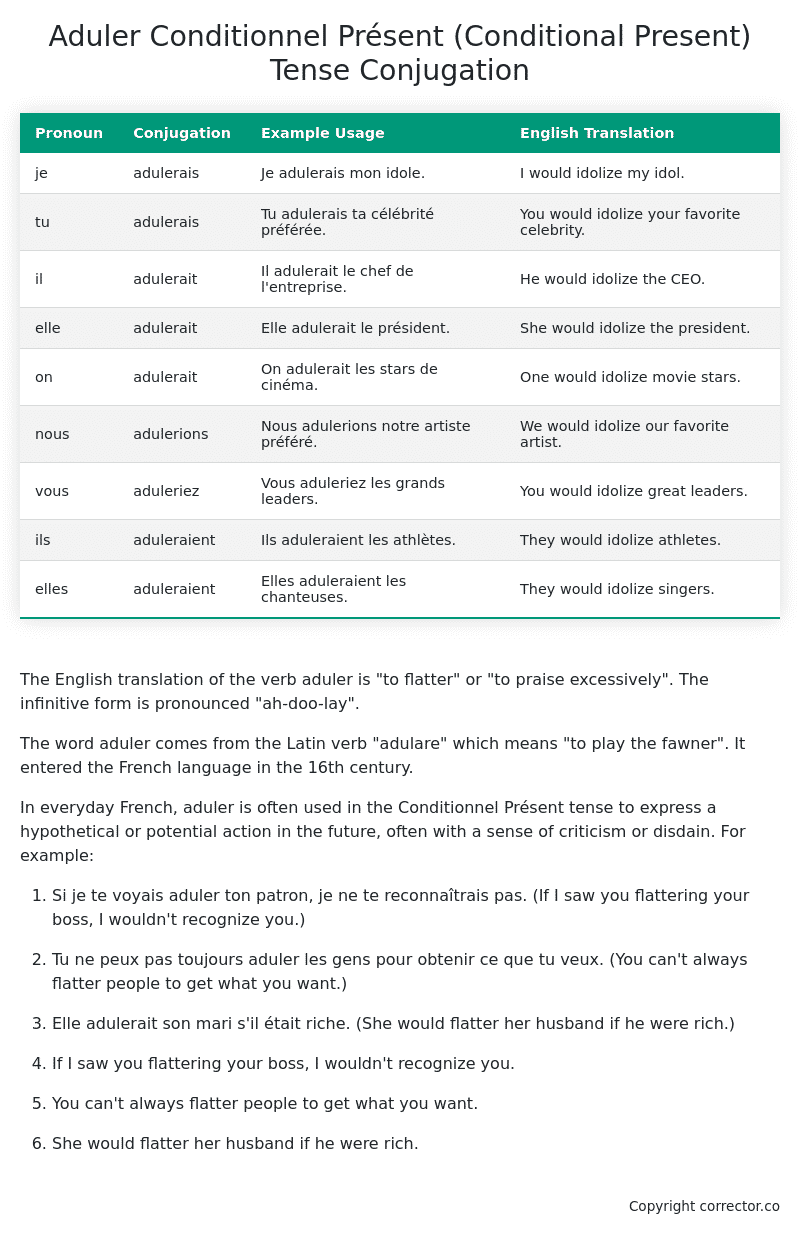Conditionnel Présent (Conditional Present) Tense Conjugation of the French Verb aduler
Introduction to the verb aduler
The English translation of the verb aduler is “to flatter” or “to praise excessively”. The infinitive form is pronounced “ah-doo-lay”.
The word aduler comes from the Latin verb “adulare” which means “to play the fawner”. It entered the French language in the 16th century.
In everyday French, aduler is often used in the Conditionnel Présent tense to express a hypothetical or potential action in the future, often with a sense of criticism or disdain. For example:
-
Si je te voyais aduler ton patron, je ne te reconnaîtrais pas. (If I saw you flattering your boss, I wouldn’t recognize you.)
-
Tu ne peux pas toujours aduler les gens pour obtenir ce que tu veux. (You can’t always flatter people to get what you want.)
-
Elle adulerait son mari s’il était riche. (She would flatter her husband if he were rich.)
-
If I saw you flattering your boss, I wouldn’t recognize you.
-
You can’t always flatter people to get what you want.
-
She would flatter her husband if he were rich.
Table of the Conditionnel Présent (Conditional Present) Tense Conjugation of aduler
| Pronoun | Conjugation | Example Usage | English Translation |
|---|---|---|---|
| je | adulerais | Je adulerais mon idole. | I would idolize my idol. |
| tu | adulerais | Tu adulerais ta célébrité préférée. | You would idolize your favorite celebrity. |
| il | adulerait | Il adulerait le chef de l’entreprise. | He would idolize the CEO. |
| elle | adulerait | Elle adulerait le président. | She would idolize the president. |
| on | adulerait | On adulerait les stars de cinéma. | One would idolize movie stars. |
| nous | adulerions | Nous adulerions notre artiste préféré. | We would idolize our favorite artist. |
| vous | aduleriez | Vous aduleriez les grands leaders. | You would idolize great leaders. |
| ils | aduleraient | Ils aduleraient les athlètes. | They would idolize athletes. |
| elles | aduleraient | Elles aduleraient les chanteuses. | They would idolize singers. |
Other Conjugations for Aduler.
Le Present (Present Tense) Conjugation of the French Verb aduler
Imparfait (Imperfect) Tense Conjugation of the French Verb aduler
Passé Simple (Simple Past) Tense Conjugation of the French Verb aduler
Passé Composé (Present Perfect) Tense Conjugation of the French Verb aduler
Futur Simple (Simple Future) Tense Conjugation of the French Verb aduler
Futur Proche (Near Future) Tense Conjugation of the French Verb aduler
Plus-que-parfait (Pluperfect) Tense Conjugation of the French Verb aduler
Passé Antérieur (Past Anterior) Tense Conjugation of the French Verb aduler
Futur Antérieur (Future Anterior) Tense Conjugation of the French Verb aduler
Subjonctif Présent (Subjunctive Present) Tense Conjugation of the French Verb aduler
Subjonctif Passé (Subjunctive Past) Tense Conjugation of the French Verb aduler
Subjonctif Imparfait (Subjunctive Imperfect) Tense Conjugation of the French Verb aduler
Subjonctif Plus-que-parfait (Subjunctive Pluperfect) Tense Conjugation of the French Verb aduler
Conditionnel Présent (Conditional Present) Tense Conjugation of the French Verb aduler (this article)
Conditionnel Passé (Conditional Past) Tense Conjugation of the French Verb aduler
L’impératif Présent (Imperative Present) Tense Conjugation of the French Verb aduler
L’infinitif Présent (Infinitive Present) Tense Conjugation of the French Verb aduler
Struggling with French verbs or the language in general? Why not use our free French Grammar Checker – no registration required!
Get a FREE Download Study Sheet of this Conjugation 🔥
Simply right click the image below, click “save image” and get your free reference for the aduler Conditionnel Présent tense conjugation!

Aduler – About the French Conditionnel Présent (Conditional Present) Tense
Formation
Common Everyday Usage Patterns
Expressing Polite Requests
Expressing Hypothetical Situations
Expressing Doubt or Uncertainty
Interactions with Other Tenses
Present Tense
Past Tense
Future Tense
Conditional Perfect
Summary
Want More?
I hope you enjoyed this article on the verb aduler. Still in a learning mood? Check out another TOTALLY random French verb conjugation!


